 Petzlover
Petzlover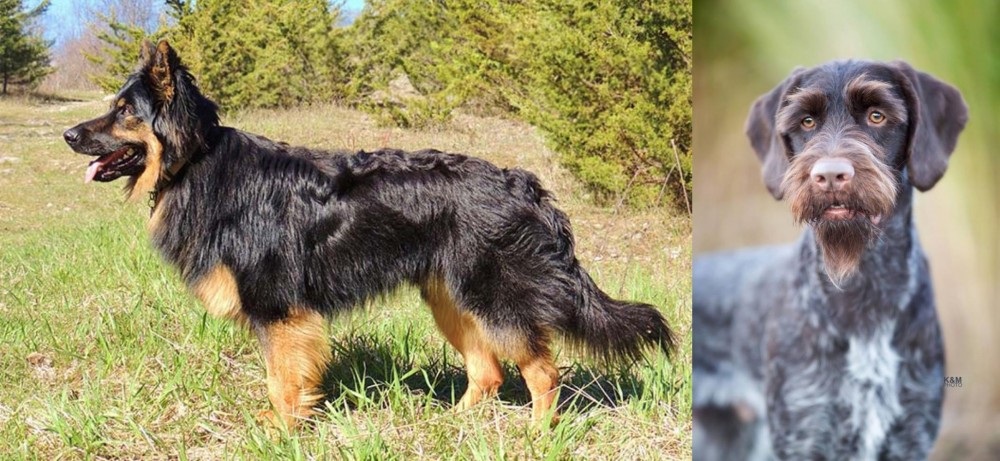 Bohemian Shepherd is originated from Czech Republic but German Wirehaired Pointer is originated from Germany. Bohemian Shepherd may grow 12 cm / 4 inches shorter than German Wirehaired Pointer. Bohemian Shepherd may weigh 7 kg / 15 pounds lesser than German Wirehaired Pointer. Both Bohemian Shepherd and German Wirehaired Pointer has same life span. Bohemian Shepherd may have less litter size than German Wirehaired Pointer. Both Bohemian Shepherd and German Wirehaired Pointer requires Moderate Maintenance.
Bohemian Shepherd is originated from Czech Republic but German Wirehaired Pointer is originated from Germany. Bohemian Shepherd may grow 12 cm / 4 inches shorter than German Wirehaired Pointer. Bohemian Shepherd may weigh 7 kg / 15 pounds lesser than German Wirehaired Pointer. Both Bohemian Shepherd and German Wirehaired Pointer has same life span. Bohemian Shepherd may have less litter size than German Wirehaired Pointer. Both Bohemian Shepherd and German Wirehaired Pointer requires Moderate Maintenance.
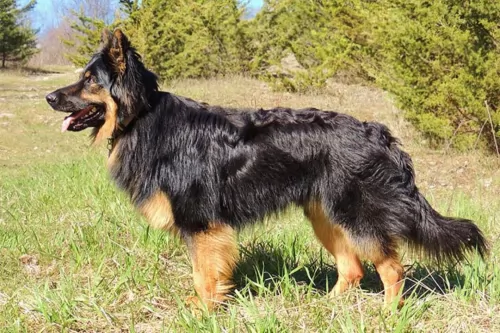 Known as the Chodský pes or the Chodenhund, the Bohemian Shepherd is native to the Czech Republic and is a herding breed. Like many other old dog breeds, nothing is 100% certain about is history. This is thought to be because the breed was developed centuries before the keeping of records. It is certain however, that the breed developed in the south-western portion of the Kingdom of Bohemia, which is now part of the Czech Republic.
Known as the Chodský pes or the Chodenhund, the Bohemian Shepherd is native to the Czech Republic and is a herding breed. Like many other old dog breeds, nothing is 100% certain about is history. This is thought to be because the breed was developed centuries before the keeping of records. It is certain however, that the breed developed in the south-western portion of the Kingdom of Bohemia, which is now part of the Czech Republic.
It is believed the Bohemian Shepherd came from herding dogs such as the Pinscher/Schnauzer, Spitzen or even a dog/wolf hybrid. It was in November 1991, that the Bohemian Shepherd Lover’s Club was founded. Many Bohemian Shepherd breeders have been registered and today the breed has earned the reputation for being a superb family dog. The dog has also been granted recognition with the Czech National Kennel Club.
 Medium to large sized, the German Wirehaired Pointer is a griffon type dog breed hailing from Germany and developed for hunting purposes in the 19th century.
Medium to large sized, the German Wirehaired Pointer is a griffon type dog breed hailing from Germany and developed for hunting purposes in the 19th century.
Known as the Drahthaar in Germany, the dog is a mix of griffon, Deutscher Stichelhaar, German Shorthaired Pointer, Deutscher Kurzhaar as well as the Pudelpointer.
He was imported into the United States in the 1920s, and it was in 1953 that the German Drahthaar Club of America was formed.
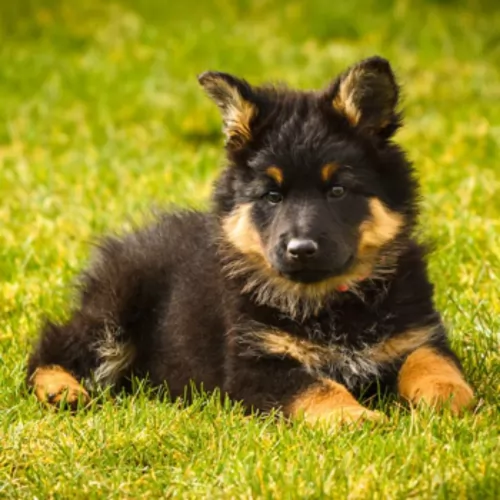 The medium sized Bohemian Shepherd looks much like a combination between the Collie and German Shepherd. He is 48-55 cm in height and weighs about 15-25 kg. The Bohemian Shepherd has a thick, long coat which is black and tan in color and with an undercoat, allowing him to cope in icy weather conditions. His well proportioned body is muscular and compact with a long bushy tail and erect ears.
The medium sized Bohemian Shepherd looks much like a combination between the Collie and German Shepherd. He is 48-55 cm in height and weighs about 15-25 kg. The Bohemian Shepherd has a thick, long coat which is black and tan in color and with an undercoat, allowing him to cope in icy weather conditions. His well proportioned body is muscular and compact with a long bushy tail and erect ears.
The Bohemian Shepherd makes a wonderful family pet, becoming very attached to his human family. He has a good reputation with children too and will get on well with other pets in the home. He is so amicable that he makes a good pet choice for those looking to own a dog for the first time.
He is intelligent and alert and also protective of his family, making him an excellent guard dog. He is easily trainable, and just like with any other dogs, will require training and socialization.
 Well muscled, this is a medium to large sized dog standing at between 57 and 68cm in height and weighing between 27 and 32kg.
Well muscled, this is a medium to large sized dog standing at between 57 and 68cm in height and weighing between 27 and 32kg.
He has a weather resistant wiry coat which is of medium length and which is wiry and harsh. Coat color is liver and white as well as black flecked.The undercoat provides insulation against the cold.
He has quite a bit of facial hair in terms of eyebrows, beard and whiskers.He has webbed feet, typical of German Pointers. His tail is docked to about two-fifths of its natural length, but these days it is often left long.
Lively, playful, affectionate and intelligent, the German Wirehaired Pointer is easy to teach. He becomes wonderfully obedient with training and socialization and responds well to instructions to sit, come and stay.
He is an active dog and likes to be involved in the activities that his human family are involved in. He becomes bored and frustrated when he doesn’t get the exercise and attention he craves.
He isn’t suited to life in the city where the premises are small as he needs plenty of vigorous exercise every day. They do well in the country where they have plenty of place to run and where their hunting skills come into action.
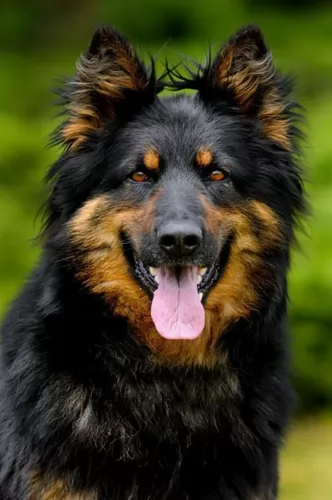 Playful by nature, friendly, gentle and co-operative, your Bohemian Shepherd will make a wonderful pet and he is a real social character, loving to spend lots of time with his human family. With minimal health conditions and without requiring much maintenance, he is an adaptable dog and will easily settle into city- or country living, so long as he is given regular exercise and attention.
Playful by nature, friendly, gentle and co-operative, your Bohemian Shepherd will make a wonderful pet and he is a real social character, loving to spend lots of time with his human family. With minimal health conditions and without requiring much maintenance, he is an adaptable dog and will easily settle into city- or country living, so long as he is given regular exercise and attention.
He is courageous and intelligent and also makes an excellent guard-dog. With so much going for this beautiful dog, he simply makes a loyal, loving and devoted family pet.
 German Wirehaired Pointers make awesome pets as they’re lively, playful, social and loving. They particularly suit living in a home where the people are active, outdoor types.
German Wirehaired Pointers make awesome pets as they’re lively, playful, social and loving. They particularly suit living in a home where the people are active, outdoor types.
They make superb jogging- or cycling companions and will thrive on sharing these activities with a family member. He is a dog who has a need to be loved and included in all that his family gets up to. He wants lots of pats and stroking to show him that you care.
Give him the love and care he craves and you’re guaranteed to have the most wonderful loving pet.
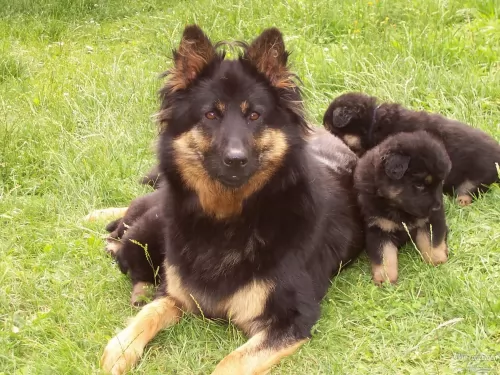 Breeding organizations are continually trying to minimize the diseases within limited-gene-pool dog breeds. While the Bohemian Shepherd is a generally health breed, there are diseases that are more common with the Bohemian Shepherd and which you need to be aware of -
Breeding organizations are continually trying to minimize the diseases within limited-gene-pool dog breeds. While the Bohemian Shepherd is a generally health breed, there are diseases that are more common with the Bohemian Shepherd and which you need to be aware of -
This is a painful disease – a problem with the formation of the hips – where the dog can develop arthritis and even become lame.
This is a condition where gas gets trapped in the stomach of your pet, so that he swells up, sometimes causing the stomach to twist. This is an emergency for your pet and it is extremely painful. Nobody really knows the cause, but when the gas is trapped inside the stomach, the bloated stomach of your pet requires you getting to the vet as quickly as you can.
Look out for Progressive Retinal Atrophy known as PRA . This is a group of degenerative diseases that affect the photoreceptor cells where the cells deteriorate and can result in blindness with your pet. Fortunately it isn’t a painful condition.
 German Wirehairs are generally healthy, and when you look after them well they can reach 12, 13 or 14 years of age. Also, if both German Wirehaired Pointer parents have certificates proving they were tested and cleared of hip dysplasia, hereditary eye diseases and blood-clotting disease, then your pet will have less risk of developing these conditions.
German Wirehairs are generally healthy, and when you look after them well they can reach 12, 13 or 14 years of age. Also, if both German Wirehaired Pointer parents have certificates proving they were tested and cleared of hip dysplasia, hereditary eye diseases and blood-clotting disease, then your pet will have less risk of developing these conditions.
Your pet isn’t likely to get sick, but like all breeds of dogs, they're prone to certain diseases and conditions. Hip Dysplasia is something that can be noticed when your pet is still a puppy.
This is a heritable condition where the thigh bone doesn't fit properly into the hip joint. Your dog can battle with pain so that he no longer wants to play, he battles to get up after lying down and he may even begin to show signs of lameness. Arthritis can develop too.
You’ll notice cloudiness on the eye lens that can grow over time. Not all cataracts impair vision, although there are some instances where vision loss is experienced. Cataracts can sometimes be surgically removed with good results.
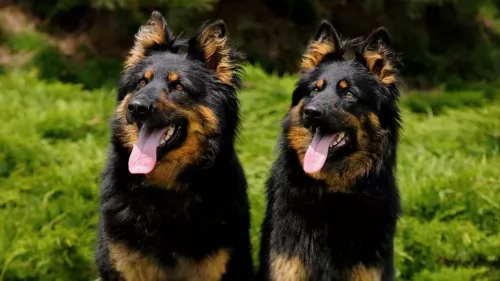 The Bohemian Shepherd is an energetic breed and will need to be exercised regularly. He’ll love to run alongside your bike on your cycling trips or you can take him on a long walk. Having said that, he is an easy going dog and can adapt to city- and country life, but if it’s city life, you can’t leave him cooped up in a small yard and think that will suffice. He has a personality that longs to be part of the family.
The Bohemian Shepherd is an energetic breed and will need to be exercised regularly. He’ll love to run alongside your bike on your cycling trips or you can take him on a long walk. Having said that, he is an easy going dog and can adapt to city- and country life, but if it’s city life, you can’t leave him cooped up in a small yard and think that will suffice. He has a personality that longs to be part of the family.
Your Bohemian Shepherd is a moderate shedder in spite of his thick beautiful coat. The coat will certainly need a good brushing at least twice a week to get rid of that loose hair. Not only that, your social Bohemian Shepherd will love the closeness to you that the brushing brings.
Keep his nails short and his teeth brushed at least 2 or 3 times a week to ensure there is no plaque build up. There are special toothbrushes and toothpastes made for dogs. Don’t use human toothpaste as the ingredients will be harmful to your pet.
Your Bohemian Shepherd, after one year of age, will eat one or two bowls of food a day. You’ll be able to tell what suits your dog, because the amount will eat about 2 to 4 cups of a good quality dry dog food a day, split into at least two meals. The amount can vary depending on its health, build, age, activity level and metabolism. Make sure it has access to water at all times and that it is changed as often as possible.
 Your German Wirehaired Pointer isn’t a heavy shedder so brushing his coat twice a week will be ideal for him to rid the coat of loose hairs.
Your German Wirehaired Pointer isn’t a heavy shedder so brushing his coat twice a week will be ideal for him to rid the coat of loose hairs.
Your German Wirehaired Pointer is an active dog and this has to be taken into account when looking at diet. He will require a diet with quality protein. You’ve also got to look at things such as whether your dog is neutered or spayed as they require less calories. On the other hand there are dogs that will require more calories because of their activity levels.
Make sure your German Wirehaired Pointer eats a top quality dog food. Add in some homemade food such as cooked brown rice, chicken and vegetables from time to time as well as some raw meat. You have to constantly remember that your dog’s health depends on the nutrition you provide.